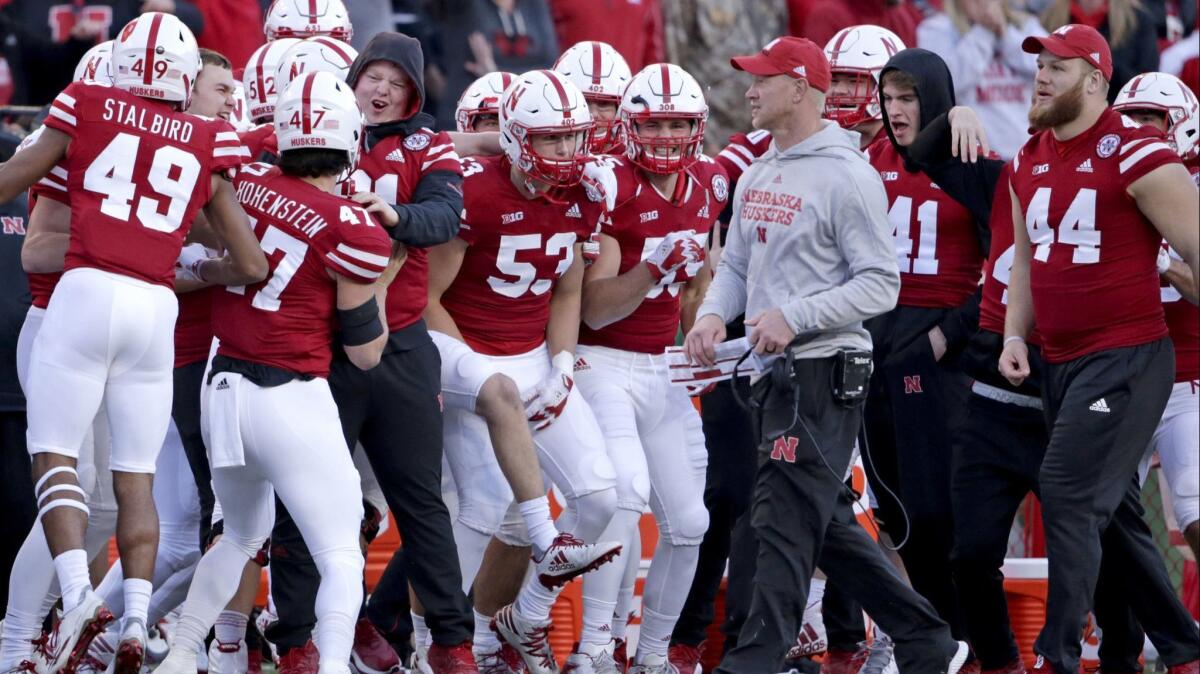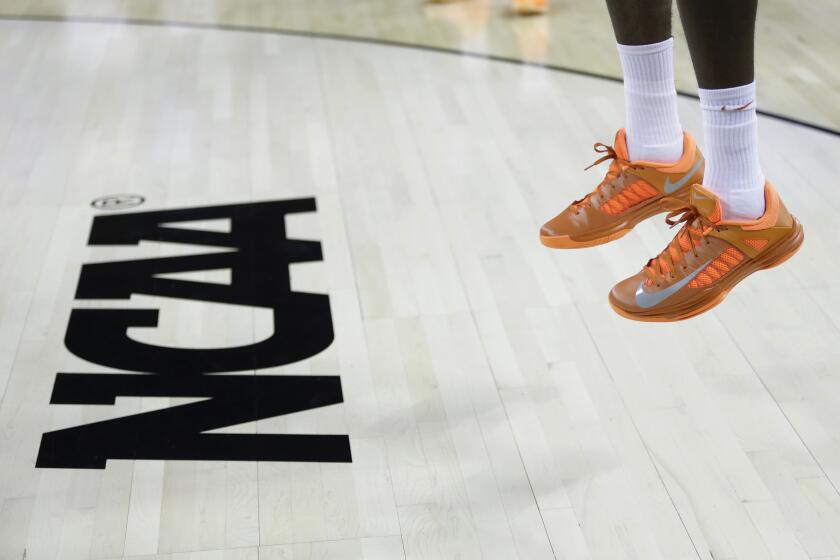Nebraska prepares for student-athlete branding by partnering with Opendorse

- Share via
With college athletes on the brink of being able to profit from their name, image and likeness, there has been debate about which schools would offer the best earning opportunities for prospective recruits: those near metropolitan areas or schools in more rural locales.
The University of Nebraska, one of college sports’ behemoths sitting firmly in America’s heartland, made a swift move Tuesday to gain some early ground in what is sure to be a budding marketplace. Nebraska announced that it would partner with Opendorse, a leader in helping sports organizations and their athletes monetize their social media followings, for the launch of the first program designed to help college athletes build their individual brands.
“Today starts a new battle in the next decade of recruiting in college sports,” said Blake Lawrence, a former Nebraska linebacker who co-founded Opendorse, which has partnered with the NHL, NFL Players Assn. and PGA Tour. That battle, he said, “is educating potential recruits on what your program is going to do to help you maximize the value of your NIL [or name, image and likeness] on campus. Just as, 50 years ago, Nebraska was the first to build a weight room and say strength training matters to winning football games, today Nebraska is saying brand building matters to setting students up for life.”
Nebraska is one of nearly 30 states that have drafted legislation in the mold of California’s Senate Bill 206, which was the first of its kind to grant college athletes the same rights as non-athlete students to profit from their NIL and was signed into law Sept. 30 by Gov. Gavin Newsom.
The NCAA is currently soliciting help from Congress to find a blanket federal solution that would placate the states’ desires while maintaining key core principles of the “collegiate model.”
Nobody knows where the NCAA rule book will ultimately land on the spectrum between the current system, which does not allow players to be compensated beyond the full cost of attendance, and a free market scenario.
“Regardless of what change comes in NIL legislation, we want every Nebraska athlete to be prepared with the blueprint for success beyond the field,” Nebraska football coach Scott Frost said. “We believe social media is at the core of this next frontier for player development.”
Lawrence and co-founder Adi Kunalic, a former Cornhuskers kicker, were introduced to the NIL issue a decade ago through teammate Sam Keller, the former Nebraska and Arizona State quarterback who sued the NCAA and EA Sports, which capitalized off players’ names, images and likenesses in the popular NCAA Football video game series. In 2014, Keller settled a class-action suit for $20 million. The video game has been discontinued, to the dismay of its fans.
California’s NCAA reform bill finally ensures that student-athletes are part of the business of college sports rather than being separate from it.
Lawrence remembers playing with his own likeness as “right outside linebacker 40.” In his virtual career, he was a superstar. In his actual career, he retired from football as a junior after four concussions. He finished his degree in marketing and got an MBA from Nebraska and was drawn to helping athletes learn the social media game. His first client was a former Cornhusker, NFL cornerback Prince Amukamara.
Opendorse now works with more than 10,000 athletes. Through NIL legislation, that number is likely to grow quickly.
“Obviously, there’s a lot of speculation about this space,” Lawrence said. “A lot of the media coverage has been about Nike and Zion [Williamson] or local car dealerships and autograph signings. While all those things are definitely in play, we believe that the more likely outcome, the most widely accessible use of name, image and likeness, is going to be social- and digital-driven.
“Every professional athlete endorsement deal starts with the question: What does their social media look like? Who follows them? How many engagements do they drive? What’s their video view count?”
NCAA President Mark Emmert says that one of the big challenges with athletes being able to profit from endorsement deals by partnering with companies like Opendorse is making sure that the market isn’t inflated by boosters who are trying to ensure an athlete signs with their school.
Lawrence says Opendorse uses various metrics to assign what a client’s market value is worth, which would make social media advertising and influencing easy to track and regulate for the NCAA and schools.
“We’re using a decade of data, thousands and thousands of transactions that occur through our technology, and what you can do with that is have a definitive market rate,” Lawrence said. “The more technology that’s involved in it, the more trackable, the more comfortable lawmakers can be with the future. The greatest risk to the model is a system that is lacking control. There must be some level of variable control, and it’s not necessarily to limit but to protect the integrity of college sports that we love so much.”
Garrett Klassy, Nebraska’s senior deputy athletic director for external relations, said Tuesday morning that the school hadn’t been thinking that far ahead. He said Nebraska was making a bigger point, regardless of what NIL legislation is approved by the NCAA, that educating athletes on how to build their social media brands will be an important tool for them.
“If legislation comes tomorrow, next week, two years from now, we want to be prepared to handle the new wave of college athletics,” Klassy said.
In Nebraska, where the Cornhuskers are the only show in town and women’s volleyball players share the same revered treatment as football players, there is a sense that there will be no shortage of NIL opportunities for college athletes.
“With the unrivaled passion of the Husker fan base,” Frost said, “I believe a current student athlete’s brand can be considerably more valuable at Nebraska.”
More to Read
Go beyond the scoreboard
Get the latest on L.A.'s teams in the daily Sports Report newsletter.
You may occasionally receive promotional content from the Los Angeles Times.












